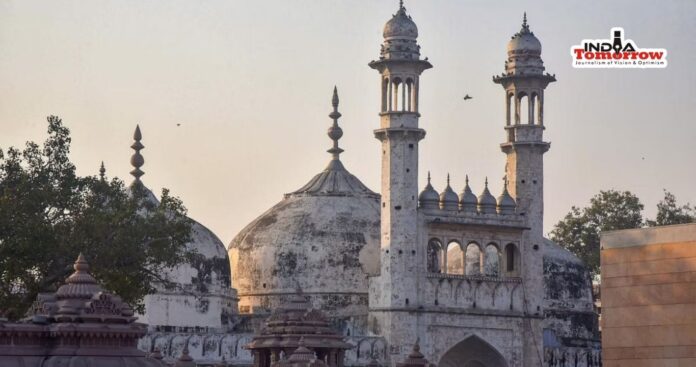By Anwarulhaq Baig
NEW DELHI: In a significant ruling favouring the Muslim side, a Varanasi court has dismissed the Hindu petitioners’ plea for a fresh survey through excavation by the Archaeological Survey of India (ASI) of the entire Gyanvapi Mosque complex, including the mosque’s central dome and cellars.
Civil Judge (Senior Division) Yughul Shambhu, presiding over the Fast Track Court in Varanasi, on Friday rejected the plea filed by Hindu petitioners in February 2024 regarding the original 1991 suit concerning the Gyanvapi Mosque. The petitioners, including the deity Vishweshar represented by Advocate Vijay Shankar Rastogi, had requested a comprehensive scientific survey of the entire mosque premises.
The dismissed plea specifically sought to investigate areas beneath the mosque’s central chamber by removing recently constructed brick walls, aiming to determine the presence of a claimed Swayambhu Jyotirling and its Argha. The petitioners had requested the use of advanced archaeological techniques, including Ground Penetrating Radar (GPR) and Geo-Radiology Systems, along with potential excavation work.
In his ruling, Judge Shambhu cited several key factors for rejecting the petition. He noted that the previous ASI survey report (designated as 420C) concerning Plot No. 9130 was still pending examination. Additionally, he emphasized that the structure where a claimed ‘Shivling’ was reportedly discovered remains under protection through a Supreme Court order.
The judge further pointed out that both the Allahabad High Court and Supreme Court had previously mandated that any surveys must employ non-invasive methodologies, explicitly prohibiting excavation techniques or property destruction. He also observed that the petitioners had not provided sufficient grounds for conducting an additional survey.
The court has scheduled the file for disposal of application on October 30, 2024.
Advocate Akhlaq Ahmad, representing the Anjuman Intezamia Masajid Committee (AIMC), welcomed the decision. Speaking after the ruling, Ahmad explained that the Muslim petitioners had opposed the application during arguments, maintaining that another survey was unnecessary at this time. He suggested that any unresolved aspects from the previous survey could be addressed later if required.
Muhammad Yaseen, Secretary of the Anjuman Intezamiya Masajid Committee, expressed satisfaction with the court’s decision. The ruling represents another significant development in the ongoing legal disputes surrounding the historic religious site.
Representing the mosque’s side, Mukhtar Ahmad Ansari expressed that the recent court ruling should not be considered a big victory for muslim side. Ansari argued that the ongoing legal battle, rooted in a case dating back to 1991, does not hold merit, as the claims have been repeatedly challenged in higher courts.
He criticized the Hindu side’s demands for excavations, questioning their lack of substantial evidence and highlighting that the mosque has stood for over 550 years. Ansari urged the opposing faction to provide historical documentation to support their claims, asserting that this complex and long legal pleas is an attempt to unjustly seize the mosque.
Following the latest ruling, Hindu petitioners have indicated their intention to challenge the decision in higher courts. Advocate Vijay Shankar Rastogi told media representatives that they would pursue appeals, arguing that a “comprehensive scientific survey was needed” to fully investigate the site.
Jagadguru Shri Rambhadracharya, commenting on the ruling, expressed confidence in eventually securing a favorable decision through appeals to the High Court and Supreme Court. The Hindu guru said “We will go to the High Court and then the Supreme Court. The decision will be in our favour…”
The ruling comes against the backdrop of a long legal battle surrounding the mosque complex. In July 2023, the Varanasi court had ordered an initial scientific survey of the complex to determine whether the mosque was constructed over a pre-existing Hindu temple structure.
District and Sessions Judge A K Vishvesha had directed the ASI to investigate settlement plot number 9130, though the wazukhana area remained excluded due to Supreme Court orders. That survey faced initial hurdles when the mosque committee sought stays from both the Allahabad High Court and Supreme Court.
However, both courts eventually allowed the survey to proceed. The ASI submitted its findings to the Varanasi court in December 2023, addressing the question of whether the mosque was built over an existing temple structure.





